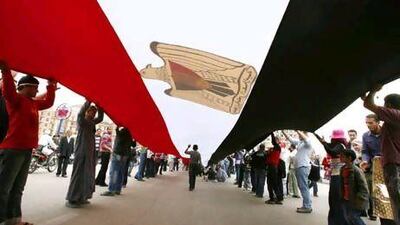CAIRO // The Egyptian government will continue to press free-market reforms even as it faces increased political pressure to reverse course and adopt populist economic policies, a senior government official says.
In the three months since Hosni Mubarak resigned from the presidency, Egypt has been riven by strikes and protests calling on the government to increase the minimum wage, raise consumer subsidies and even retake control of some former state companies that were privatised in the past decade. In many circles, terms such as "economic reform" and "privatisation" are now associated with the corruption of the previous regime being exposed in trials of former high-level officials.
But with the budget deficit closing in on 10 per cent of GDP, the government does not have the resources to make significant investments in the economy on its own, said Neveen el Shafei, the vice chairman of the general authority for investment and free zones.
"I think that the government today has to position itself to try and attract private investment, whether it's domestic or foreign, to try and bridge that [budget] gap, even if there are political tendencies in the other direction," Ms el Shafei said on the sidelines of a natural gas conference in Cairo.
"When you look at some of the fiscal and monetary policies that were in place, they were there for a reason - our fiscal deficit will probably present a challenge."
The budget deficit was expected to increase to 9.38 per cent of GDP in the next fiscal year, up from 8.5 per cent this year, Samir Radwan, the minister of finance, told Reuters last week. Egypt's fiscal year ends in June.
The economy contracted 7 per cent in the tumultuous first quarter of this calendar year, Mr Radwan said last month, as widespread street protests brought commerce to a halt and kept well over a million tourists away from Egypt. The IMF expects the Egyptian economy to grow only 1 per cent by the end of the calendar year.
The economic slowdown has been met with a sharp fall in foreign direct investment (FDI), said Ms el Shafei. The Egyptian government had targeted FDI flows of US$7 billion (Dh25.71bn) by June, but so far only $3bn to $4bn has come into the economy, she said.
A similar shortfall is expected next year, she added.
"It's going to be a challenge, especially with what is happening in the Middle East and North Africa region," she said. "A number of countries affected are representing potential FDI investors."
As Ms el Shafei spoke, Egypt's doctors were starting a nationwide strike to urge the government to increase healthcare spending from 3.5 per cent of the budget to 15 per cent, among other demands. On Saturday, thousands rallied in the industrial city of Helwan, demanding the government reopen closed factories and create more jobs.
Egypt began to move away from the command economy legacy of former president Gamal Abdel Nasser in 1991 by ending many price controls and subsidies. It sped up reforms in 2005 by reducing regulation of private companies, spinning off state-owned concerns and introducing a "flat" income tax rate of 20 per cent, which quadrupled revenues. Many of the benefits of these reforms accrued to the friends and family of Mr Mubarak, but GDP growth also increased to above 6 per cent annually.
"The government will pursue this open-market environment and free-market growth," Ms el Shafei told an audience of investors in Egypt's natural gas sector on Tuesday. The government would honour all of its previous contracts and promises, she added.

